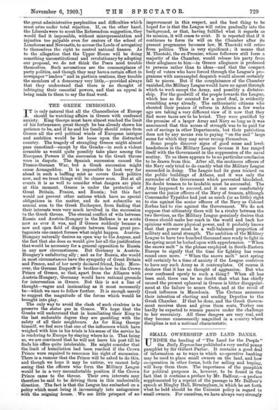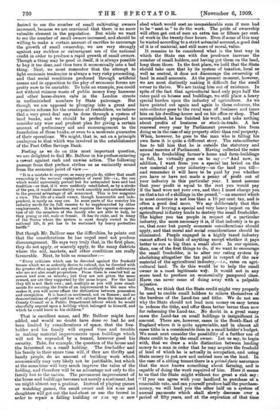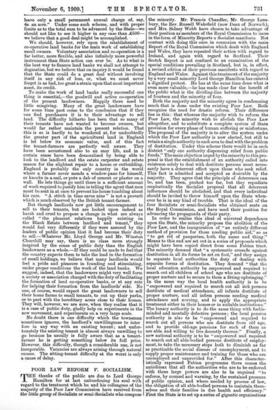SMALL OWNERSHIP AND LAND BANKS.
TTNDER the heading of "The Land for the People" kJ the Daily Ezpress has published a very useful penny pamphlet by Sir Gilbert Parker. It contains a good deal of information as to ways in which co-operative banking may be used to place small owners on the land, and how co-operation in other forma, both for selling and. buying, will keep them there. The importance of the pamphlet for political purposes is, however, to be found in the fact that it contains a preface by Mr. Ballour,—a preface supplemented by a reprint of the passage in. Mr. Balfour's speech at Bingley Hall, Birmingham, in which he set forth what he held. should be the Unionist policy in regard to small owners. For ourselves, we have always very strongly desired to see the number of small cultivating owners increased, because we are convinced that there is no more valuable element in the population. But while we want to see the number of small owners increased, and should be willing to make a certain amount of sacrifice to encourage the growth of small ownership, we are very strongly against any reckless or extravagant use of the national credit in order to produce a rapid growth of small owners. Though a thing may be good in itself, it is always possible to buy it too dear, and thus turn it economically into a bad thing. Next, we must remember that the attempt to fight economic tendencies is always a very risky proceeding, and that social conditions produced through artificial means and in opposition to the play of economic forces are pretty sure to be unstable. To take an example, you could not without ruinous waste of public money keep hanso-ms and other horse-drawn cabs in the London streets in undiminished numbers by State patronage. But though we are opposed to plunging into a great and expensive scheme for the creation of freeholders, we believe that a very great deal may be done through a system of land banks, and we should be perfectly prepared to consider any wise and prudent plan for giving a certain amount of preliminary aid and encouragement to the foundation of these banks, or even to a moderate guarantee of their operations. We might, that is, act on a principle analogous to that which was involved in the establishment of the Post Office Savings Bank.
Feeling as we do on this most important question, we are delighted to find Mr. Balfour in his preface entering a caveat against rash and unwise action. The following passage from that preface strikes us as eminently sound from the economic point of view :— eat is a mistake to suppose, as many people do, either that small ownership is the maturat organisation of rural life—i.e., the one which would universally prevail but for antiquated laws and bad tradition—or that, if it were suddenly established, as by a stroke of the pen, it would immediately work smoothly and automatically to the general advantage of all concerned. This is too sanguine a view. The life of a small owner, though honourable and bide- pendent, is rarely an easy one. In seine parts of the country his industry needs for its full success to be supplemented by other employments. It is laborious, and requires the vigorous co-opera- tion of all the members of the family who are able to help, be they young or old, male or female. It has its risks, and in many of the States where the system is most deeply rooted in the national life, it yet has to be sustained by heavy protective tariffs."
But though Mr. Balfour sees the difficulties, he points out that the considerations he has urged need not produce discouragement. He says very truly that, in the first place, they do not apply, or scarcely apply, to the many districts where the soil, markets, and other conditions are really favourable. Next, he bids us remember :— "Every criticism which can be directed against the freehold tenure which we so ardently desire to extend, can be directed with far greater effect against any attempt to multiply small cultivators who are not also small proprietors. From them is exacted toil as severe and care as minute; but they are not given the same reward, nor are they supported by the same hopes. For the land they till is not their own ; and, multiply as you will your enact- ments for securing the fruits cf an improvement to the man who makes it, you will never efface the distinction between possession and occupation. It is based on sentiment, not on finance; and no demonstrations of profit and loss will extract from the tenant of a County Council or a Public Department labour which he would cheerfully expend upon a holding which belonged to himself, and . which ho could leave to his children."
That is excellent sense, and Mr. Balfour might have added, and would no doubt have done so had he not been limited by considerations of space, that the free- holder and his family will expend time and trouble in making material improvements upon buildings which will not be expended by a tenant, however good his security. Take, for example, the question of the house and the farmstead on a small holding. The freeholder and his family in their spare time will, if they are thrifty and handy people, do an amount of building work which economically may very likely not be justifiable, but which at the same time will very much improve the value of the holding, and therefore will be an advantage not only to the family but to the nation. The permanent improvement of the home and buildings becomes not merely a sentiment, but we might almost say a pastime. Instead of playing games or watching games, the small owner and his sans and daughters will get oat the tool-chest or use the trowel in order to repair a falling baihiing or ran up a new shed which would cost no inconsiderable sum if men had to be 'sent in" to do the work. The pride of ownership will often get out of men an extra ten or fifteen per cent. of work in the twenty-four hours. Even if some of this may be wasted according to a strict actuarial account, a good deal of it is of material, and still more of moral, value.
It remains to be considered what is the best way in which the State can with due prudence increase the number of small holders, and having got them on the land, keep them there. In the first place, we hold that the State should take care that by its system of taxation, local as well as central, it does not discourage the ownership of land in small amounts. At the present moment, however, we are most distinctly making it difficult for the small owner to thrive. We are taxing him out of existence. In spite of the fact that agricultural land only pays half the rates paid on houses and buildings, we still place a heavy special burden upon the industry of agriculture. As we have pointed out again and again in these colunims, the rate-collector goes to the rural man of business and taxes him on his dwelling-house and on his office or shop. That accomplished, he has finished his work, and asks nothing about profits of business or stock-in-trade. A law renewed every year by Parliament prevents him from doing so in the case of any property other than real property. When, however, he goes to the man who is tilling his own farm it is quite a different story. The rate-collector has to tell him that he is outside the statutory and annual mercies of Parliament. Having collected the rates upon the freeholding farmer's home and farm-buildings in full, he virtually goes on to say :—" And now, in addition, I want from you a special tax levied on the raw material of your industry—on the land you till— and remember it will have to be paid by you whether you have or have not made a, penny of profit out of your industry in this particular year. I must assume that your profit is equal to the rent you would pay if the land were not your own, and then I must charge you on that a tax of x shillings in the pound,"—an amount which in most counties is not leas than a 10 per cent. tax, and is often a good deal more. We say deliberately that this system of levying a special and very heavy impost on the agricultural industry tends to destroy the amen freeholder. The higher you tax people in respect of a particular industry, the more necessary it is, if that industry is to go on, that none but purely economic considerations should apply, and that moral and social considerations should be eliminated. People engaged in a highly taxed industry cannot afford to think of anything except whether it pays better to run a big than a small show. In our opinion, then, one of the first things to do, if we want to encourage the small freeholder, is to alter our rating system by abolishing altogether the tax paid in respect of the raw material of the agricultural industry,—i.e., rates on agri- cultural land. To do this would be to help the small owner in a. most legitimate way. It would not in any sense tend to produce an economically pampered class. Harm can never come of doing away with a palpable injustice.
Next, we think that the State credit might very properly be used to enable small holders to relieve themselves of the burdens of the Land-tax and tithe. We do not Bee why the State should not lend men money on easy terms to redeem the tithe, and offer them better terms than now for redeeming the Land-tax. No doubt in a great many cases the Land-tax on small holdings is insignificant in amount. There axe, however, cases in the South-East of England where it is quite appreciable, and in almost all cases tithe is a considerable item in a small holder's budget. We must next consider the possibility of a further use of State credit to help the small owner. Let us say, to begin with, that we draw a wide distinction between lending money to a man in order that he may acquire the freehold of land of which he is actually in occupation, and using State money to put new and untried men on the land. In the case of a sitting tenant there is a printii-facie assurance that the man knows something about farming, and is capable of doing the work required of him. Here it seems to 1113 that the State might without too great a risk say : "If you can agree with your landlord to purchase at a reasonable rate, and can yourself produce half the purchase- money, -we will lend you the other half on a, system of annual payments which shall slowly decrease over a period of fifty years, and at the expiration of that time leave only a small permanent annual charge of, say, 4s. an acre." Under some such scheme, and with proper limits as to the total sum to be advanced by the State—we should not like to see it higher in any case than ...t500— we believe that a good deal might be accomplished. • • We should, however, rely upon the establishment of co-operative land banks for the main work of establishing small owners. Voluntary association and co-operation is a far better, more flexible, and also infinitely more powerful instrument than State action can ever be. As to what is the best way to finance land banks we shall not attempt to dogmatise, but we believe that on inquiry it would be found that the State could do a great deal without involving itself in any risk of loss, or, what we must never forget is as bad, too great a strain upon that most important asset, its credit.
To make the work of land banks really successful one thing is essential,—the goodwill and active co-operation of the present landowners. Happily there need be little misgiving. Many of the great landowners have for some time past come to the conclusion that if they can find purchasers it is to their advantage to sell land. The difficulty hitherto has been that so many of their tenants have not• wanted to become owners, but would far rather maintain the present relation. That -this is so is hardly to be wondered at, for undoubtedly the greater part of the agricultural land in England -is let below its economic value, and of this fact the tenant-farmers are perfectly well aware. They have been accustomed also to an easy life, and in a certain sense have been demoralised by being able to look to the landlord and the estate carpenter and- estate mason for the slightest repair to a house or outbuilding. England is probably the only country in the world where a farmer never mends a window-pane for himself, or knocks in a nail, or puts a dab of cement or plaster on a wall. He lets things go until there is a sufficient amount of work required to justify him in telling the agent that men must be sent in at once to prevent his house tumbling about his ears. "A stitch in time saves nine" is not a proverb which is much observed by the British tenant-farmer. But though landlords now get little encouragement to sell to their tenants, but are looked upon indeed as harsh and cruel to propose a change in what are always .called " the pleasant relations happily existing on the Blank Estate between landlord and tenant," they .would feel very differently if they were assured by the leaders of public opinion that it had become their duty to sell.—Whatever Mr. Lloyd George and Mr. Winston Churchill may say, there is no class more strongly inspired by the sense of public duty than the English landowners as a whole.—If they could be made to feel that the country expects them to take the lead in the formation of small holdings, we believe that many landlords. would feel a pride and pleasure in founding and stimulating, under proper conditions the work of the land banks. We suggest, indeed, that the landowners might very well form a society or association charged with the duty of facilitating the formation of land co-operative banks, or at any rate for helping their formation from the landlords' side. No one, of course, would expect the great landowners to sell their home farms to small tenants, to cut up their parks, or to part with the hereditary acres close to their homes. They will, however, we are sure, when they realise that it is a case of public duty, gladly help on experiments in the new movement, and experiments on a very large scale.
No doubt there is one difficulty which the townsman 'sometimes ignores, the landlord's unwillingness to inter fere in any way with an existing tenant; and unfor- Aunately the existing tenant is almost always unwilling to go because he usually is fully aware that as a tenant- farmer he is getting something below its full price. However, this difficulty, though a considerable one, is not insuperable. Vacancies are always arising through natural causes. The sitting-tenant difficulty at the worst is only a cause of delay.
































































 Previous page
Previous page